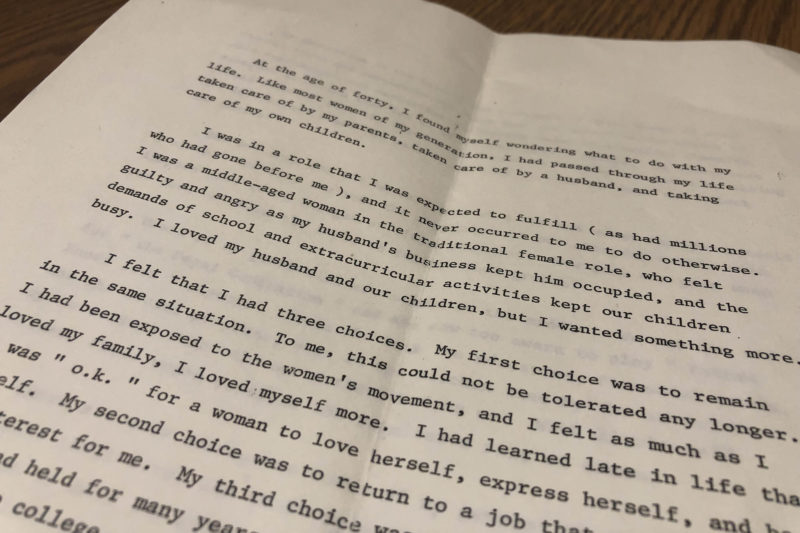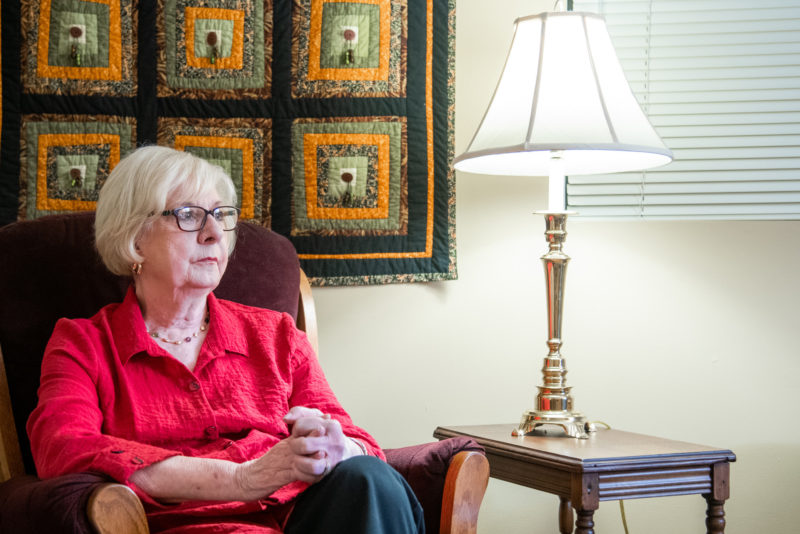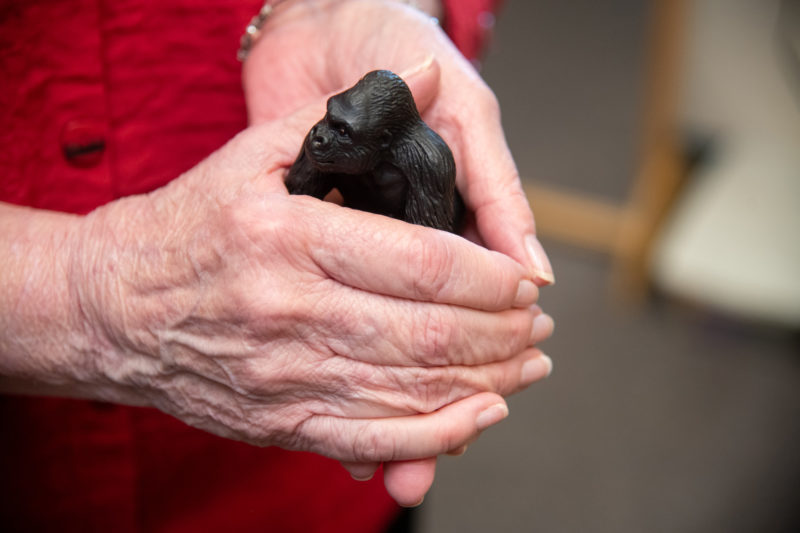University of Lynchburg issued the following announcement on September 23.
At 40, Norma White ’90, ’94 MEd decided to fulfill a lifelong dream. She would attend college and become a mental health counselor. Lynchburg’s Access Program was there to make it happen — first with a bachelor’s degree in psychology, then a Master of Education in Agency Counseling.
Thirty-some years later, White, a licensed marriage and family therapist and licensed professional counselor, says she owes her career to the University, and she wants to give back.
“Lynchburg built this,” she said on a recent afternoon at Couples & Kids, her Forest, Virginia, counseling center that has helped hundreds of families, couples, and individuals since 2000 through play therapy and other techniques.
“I am overwhelmed with joy to be able to give this gift to the school because it has made a tremendous difference [for me].”
White is giving Lynchburg $2 million, adding to an outstanding fundraising year that totaled $7.2 million. Most of those gifts — about $5 million — came from cash gifts and annual giving, said Vice President for Advancement Dr. Mike Bonnette.
One million dollars will come over the next five years, while the other half is a planned gift. The funds will support two newly created endowments: the Connie A. Messerschmidt Access Student Scholarship, named in honor of the Access Program’s first director, and the Norma S. White Counseling Professorship.
“We are beyond grateful to Norma for this tremendous gift,” Bonnette said. “This has been a particularly strong year for us because of all the on-the-ground fundraising our team has done, and Norma had a huge part in it.
“I’m even more excited because of what her gifts will mean for the University. Our Access Program is a wonderful community resource, and Norma’s support will provide a much-needed boost.”
White, a former nurse who earned her degrees while raising two children, is especially excited about helping other adult students afford a college education.
“It is tough for an adult student who maybe works full time to come back to school and graduate,” she said. “To have someone to be able to go to school and not have to worry about paying for it — I can’t wait!”
Messerschmidt played a key role in convincing White, a stay-at-home mother at the time, to attend Lynchburg. In an essay titled “The Last Dinosaur,” written for her Senior Symposium with Dr. Julius Sigler ’62, White describes what compelled her in the mid-1980s to make such a major change.
 “The Last Dinosaur,” an essay by Norma White for her Senior Symposium, explains what brought her to Lynchburg at the age of 40.
“The Last Dinosaur,” an essay by Norma White for her Senior Symposium, explains what brought her to Lynchburg at the age of 40.
“At the age of forty, I found myself wondering what to do with my life,” it begins. “I was in a role that I was expected to fulfill, and it never occurred to me to do otherwise. I was a middle-aged woman in the traditional female role, who felt guilty and angry as my husband’s business kept him occupied, and the demands of school and extracurricular activities kept our children busy. I loved my husband and children, but I wanted something more.”
White had caught a glimpse of what “more” could be as a nurse, but she knew that wasn’t exactly it for her. Growing up in rural Amherst County, her parents sent her to Virginia Baptist Hospital Nursing School instead of college.
She liked nursing, but during training at St. Elizabeth’s Hospital in Washington, D.C., she discovered a passion for psychiatry. That passion stayed with her on the surgery floor at Lynchburg General Hospital, and once motherhood kept her home. It lingered in the kitchen cooking for her family, and while volunteering with the Red Cross, or with the Parent Education League in Lynchburg.
If she was going to follow her dream, now was the time. A friend had gone back to school to study education, and White wondered: If she can do it, why not me?
“So, very tentatively, I met Vicky Lunsford, who was the associate director of the Access Program, and ultimately Connie Messerschmidt, and they signed me up,” White said.
Hired in 1985 to direct the then-new program for adult students, Messerschmidt’s charge was to increase the visibility of adult learning opportunities in the Lynchburg area. In addition to expanding adult enrollment at what was then Lynchburg College, she was asked to weave those new programs — and the nontraditional students that came with them — seamlessly into the campus community.
It worked for White, who attended classes around her children’s elementary school schedule and got involved in as many opportunities as she could. She was president of the area’s first chapter of Psi Chi, the International Honor Society for Psychology. She helped her senior class raise money for the College Lake cabin and worked in the Access Program.
With the help of graduate assistants like White, Messerschmidt grew the program from a few dozen to almost 500 students by the early 1990s.
 Norma White in her office at Couples & Kids
Norma White in her office at Couples & Kids
Over the years, that number has dwindled due to changing demographics and a heightened focus on traditional-age college students. Last fall, Provost and Vice President for Academic Affairs Dr. Allison Jablonski charged a task force with reviving the program.
The task force is headed up by longtime professor Dr. Roger Jones, who serves as vice provost and dean of graduate studies, among other duties. He says White’s support for the Access Program is vital — and perfectly timed.
“This gift could not come at a better time,” Jones said. “We are refocusing the University’s efforts to recruit and provide quality programs for adult learners. Scholarships from the endowment will be instrumental in attracting and retaining adult learners.”
At the same time, White’s gift will help attract — and retain — quality faculty. The Norma S. White Professor of Counseling will teach in the College of Education, Leadership Studies, and Counseling in the field of clinical mental health counseling. Requirements include a “strong commitment to students, exemplary instructional methods in the University classroom, and an emphasis on research, particularly involving students in a collaborative fashion.”
In addition to supplementing the salary, the professorship fund also may be used to support a student assistantship for collaborative research, curricular projects, and to provide an operating budget to support the work.
The professorship illustrates White’s deep gratitude to the faculty at Lynchburg. “When I think of the professors, I think of their intelligence, I think of their warmth, I think of willingness to go above and beyond with the students,” she said.
“Their willingness to engage students in dialogue and meaningful conversations. … They’re so gifted. And I’m sure they do this and don’t even think about it. They have no idea the impact they have on the students. And it’s sort of like in therapy. We most of the time never hear after our clients go on, but I know I make a difference.”
What she learned at Lynchburg impacted “everything,” she says. “To be able to write a paper and have it critiqued — that’s growth. To be in the psychology department and listen to the teachings of that faculty and it was like I was a sponge, and I just could not get enough of what they were saying.”
White still remembers what it felt like when she arrived on campus.
“I knew when I came on campus that it was the right fit, and the first class with Dr. Richard Burke, who taught English literature, I was absolutely scared to death,” White recalled. “I didn’t know how to use a computer, didn’t know how to create a paper, so everything was just drip-by-drip progress, step by step. To learn how to function in the college environment. It was just such a gift.”
 Norma White holds a toy gorilla used in the play therapy room at Couples & Kids.
Norma White holds a toy gorilla used in the play therapy room at Couples & Kids.
White has come a long way since that first class. In 2011, she was awarded the J. Edward Petty Outstanding Graduate Alumni Award for distinguished professional work in education and related community service.
Her life’s work, Couples & Kids, was born from Carl Jung’s sand play therapy, and everything else White learned at Lynchburg. Various moves and transformations have led it to its current location on Vista Centre Drive in Forest, where they’ve been busier than ever. And they’re always looking for more therapists.
“The goal is to keep this place rockin’ and rollin’ during COVID,” White said. “I honestly think we could work seven days a week, but we have to take care of our mental health.”
White has two female partners — University of Lynchburg alumni — who will take over the practice when she retires. She’s been planning to retire for about five years now, she said, laughing.
“I love, love, love my work,” White said. “The skills I learned at Lynchburg College changed my life — and changed the lives of so many families that we work with. And that’s our motto: Making a difference in the lives of families, one by one.”
Maybe it’s hard to stop when you could change one more life.
Original source can be found here.

 Alerts Sign-up
Alerts Sign-up